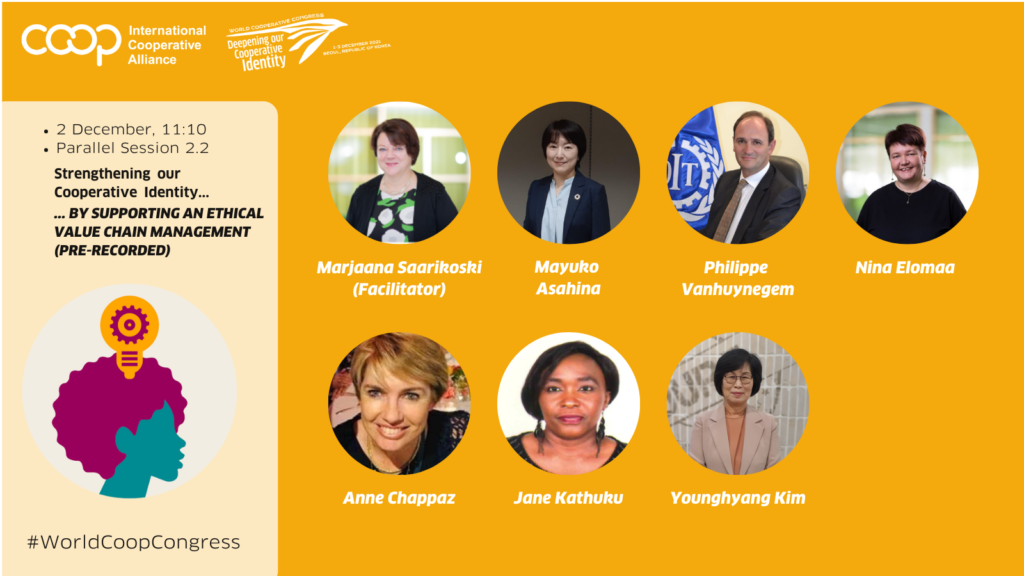
Delegates gathered on the morning of 2 December for parallel session 2.2 of the World Cooperative Congress, which explored how the coop movement can commit to its identity by supporting an ethical value chain.
ICA Board Director Marjaana Saarikoski facilitated the session and set the scene for the discussion by describing value chains as “a network of trusted and respected companies who share common values to bring welfare to the whole chain.” Ms Saarikoski pointed out that when it comes to cooperatives, one can often find similarities in thinking through the value chain, such as honesty and high levels of openness, and that this session would explore how coops create added value within these chains towards the implementation of the SDGs.
Philippe Vanhuynegem, Chief of the Fundamental Principles and Rights at Work Branch of the International Labour Organisation, gave a presentation to attendees where he laid out key conventions on workers’ rights, including on forced labour, child labour, discrimination and freedom of association. Mr Vanhuynegem then cited the challenges workers still face in these areas, showing that there is some way to go in the full implementation of these conventions in value chains around the world. Emergent trends in responsible business practices were also shared by Mr Vanhuynegem, including increased mandatory due diligence, rethinking of business models, increased recognition of the role of financial actors and the use of traceability or chain of custody tools. Mr Vanhuynegem highlighted the importance of international cooperation, and invited coops to join the SDG 8.7 Alliance, as well as forced labour and child labour platforms where parters are working together to fight against these practices.
The session also heard from some examples of cooperatives pursuing great ethical consumption and transparency in their processes, such as Kenya Cooperative Coffee Exporters(KCC).
The Managing Director of KCC, Jane Kathuku, spoke about ethical coffee value chain management in Kenyan Coops, stating that “KCC, being a farmer-owned cooperative society, has been on the forefront to ensure an ethical coffee value chain that guarantees sustainability and consistency.” Ms Kathuku explained that KCC has engaged in supporting farmers and primary cooperative societies to gain certifications, training, securing decent work pay for farmers and lastly increasing transparency in pricing of growers’ coffee.
Mayuko Asahina, the Japanese Consumers’ Co-operative Union’s Director of Brand Strategy shared information on Japanese CO·OP Brand Products in her presentation to the session, explaining that these products, launched over sixty years ago, have been promoting ethical consumption long before the existence of the SDGs or widespread use of the term “ethical consumption”. Ms Asahina also explained the different types of certification marks used on CO·OP Brand Products which makes it easier for consumers to understand the different issues of sustainability at play in the products they buy and stressed the importance of strong branding to ensure that consumers view ethical products positively in terms of quality.
Nina Elomaa, the Senior Vice-President of Sustainability at Finnish retailing cooperative organisation SOK/ S Group, focused her presentation on the Human Rights and Environmental Due Diligence(HREDD) legislation in Europe, describing it as a “game changer.”
“Traceability and transparency is important but it is also extremely complicated,” said Ms Elomaa, stressing that because there are many actors along the value chain, it is important for all players to be in discussion about how data can be used to increase traceability and transparency.
Anne Chappaz, the Chief of Institutions and Ecosystems at the International Trade Centre, shared insights on efforts to upscale coop to coop trade. “When co-ops are linked into global value chains it makes a big difference for prosperity, people and planet, and it can create a real competitive advantage for other value chain actors.”
The International Trade Centre have been working with the ICA to explore how coop to coop trade might be upscaled and have so far found that there is need around information on both the sides of buyer coops and supplier coops to enable them to work together, as well as some support needed to ensure than supplier coops are able to meet buyers’ core requirements around price and product quality. More findings will be presented from this work as it progresses.
In her talk, Ms Chappaz also highlighted a number of benefits that occur when coops are part of value chains, saying “in this world of impact investing, global corporate social responsibility and woke consumers, these ‘beyond efficiency’ elements do create competitive advantage for all the actors in the value chain. So doing good is also good for business, and when coops create linkages across the chain, that additional value they can create is even stronger.”
